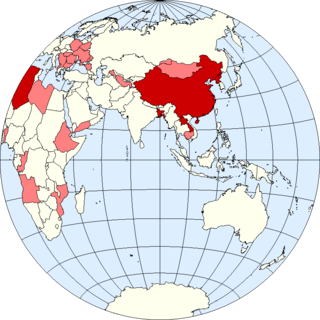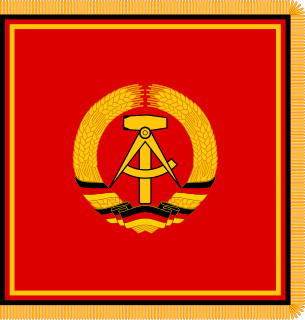These are lists of incumbents, including heads of states or of subnational entities.

The politics of Vietnam are defined by socialist republic framework which is ultimately controlled by a single-party. The President of Vietnam is the head of state, and the Prime Minister of Vietnam is the head of government, both of these are separate from the General Secretary of the Communist Party of Vietnam who leads the Communist Party and is head of the Politburo & the Central Military Commission, thus the General Secretary is the de facto supreme leader of Vietnam. Executive power is exercised by the government and the President of Vietnam. Legislative power is vested in the National Assembly of Vietnam. The Judiciary is independent of the executive. The parliament adopted the current Constitution of Vietnam, its fifth, on 28 November 2013.
A satellite state is a country that is formally independent in the world, but under heavy political, economic, and military influence or control from another country. The term was coined by analogy to planetary objects orbiting a larger object, such as smaller moons revolving around larger planets, and is used mainly to refer to Central and Eastern European countries of the Warsaw Pact during the Cold War or to Mongolia or Tannu Tuva between 1924 and 1990, for example. As used for Central and Eastern European countries it implies that the countries in question were "satellites" under the hegemony of the Soviet Union. In some contexts it also refers to other countries in the Soviet sphere of influence during the Cold War, such as North Korea and Cuba, and to some countries in the American sphere of influence, such as South Vietnam. In Western usage, the term has seldom been applied to states other than those in the Soviet orbit. In Soviet usage, the term applied to the states in the orbit of Nazi Germany, Fascist Italy, and Imperial Japan.

A pioneer movement is an organization for children operated by a communist party. Typically children enter into the organization in elementary school and continue until adolescence. The adolescents then typically join the Young Communist League. Prior to the 1990s there was a wide cooperation between pioneer and similar movements of about 30 countries, coordinated by the international organization, International Committee of Children's and Adolescents' Movements, founded in 1958, with headquarters in Budapest, Hungary.
A communist state, also known as a Marxist–Leninist state, is a one-party state that is administered and governed by a communist party guided by Marxism–Leninism. Marxism–Leninism was the state ideology of the Soviet Union, the Comintern after Bolshevisation and the communist states within the Comecon, the Eastern Bloc and the Warsaw Pact. Marxism–Leninism remains the ideology of several communist states around the world and the official ideology of the ruling parties of China, Cuba, Laos and Vietnam.
The President of the Republic is a title used for heads of state and/or heads of government in countries having republican form of government.

People's republic is an official title, usually used by some currently or formerly communist or left-wing states. It is mainly associated with soviet republics, socialist states following people's democracy, sovereign states with a democratic-republican constitution usually mentioning socialism, as well as some countries that do not fit into any of these categories.
A presidium or praesidium is a council of executive officers in some political assemblies that collectively administers its business, either alongside an individual president or in place of one.
The President of the Council of Ministers is the most senior member of the cabinet in the executive branch of government in some countries. Some Presidents of the Council of Ministers are the heads of government, and thus are informally referred to as a Prime Minister or Premier.

The president of the German Democratic Republic was the head of state of the German Democratic Republic, commonly known as East Germany, from 1949 until 1960. The office was created by the Constitution of 1949. The president of the Republic was elected by the People's Chamber (Volkskammer) and the Chamber of States (Landerkammer), the two chambers of parliament. The office was mostly ceremonial in nature. If necessary, the President of the Volkskammer acted as the president of the Republic.
State Council may refer to:

The president of the State Affairs Commission of the Democratic People's Republic of Korea, previously referred to as the chairman of the State Affairs Commission, is the head of state of North Korea. The president heads the State Affairs Commission (SAC), which is the highest leadership institution in North Korea, and serves as the commander-in-chief of the North Korean armed forces.
The legislatures of communist states included:

Socialist state emblems usually follow a unique style consisting of communist symbolism. Although commonly referred to as coats of arms, most are not actually traditional heraldic achievements. Many communist governments purposely diverged from heraldic tradition in order to distance themselves from the monarchies that they usually replaced, with coats of arms being seen as symbols of the monarchs.

Military aircraft insignia are insignia applied to military aircraft to identify the nation or branch of military service to which the aircraft belong. Many insignia are in the form of a circular roundel or modified roundel; other shapes such as stars, crosses, squares, or triangles are also used. Insignia are often displayed on the sides of the fuselage, the upper and lower surfaces of the wings, as well as on the fin or rudder of an aircraft, although considerable variation can be found amongst different air arms and within specific air arms over time.

The International Organization of Journalists was an international press workers' organization based in Prague, Czechoslovakia, during the Cold War. It was one of dozens of front organizations launched by the Soviet Union in the late 1940s and early 1950s. It was controlled in Prague by the Central Committee of the Czechoslovak Communist Party, with the assistance of KGB agents. It was described by the U.S. Central Intelligence Agency as "an instrumentality of Soviet propaganda".

The 10th anniversary celebrations of founding of the People's Republic of China were held on 1 October 1959. The main event was held in Tiananmen Square in Beijing. A grand banquet with many international dignitaries had been organized on the preceding evening.
Secretary is a title often used in organizations to indicate a person having a certain amount of authority, power, or importance in the organization. Secretaries announce important events and communicate to the organization. The term is derived from the Latin word secernere, "to distinguish" or "to set apart", the passive participle meaning "having been set apart", with the eventual connotation of something private or confidential, as with the English word secret. A secretarius was a person, therefore, overseeing business confidentially, usually for a powerful individual.
Communist symbolism represents a variety of themes, including revolution, the proletariat, peasantry, agriculture, or international solidarity.








